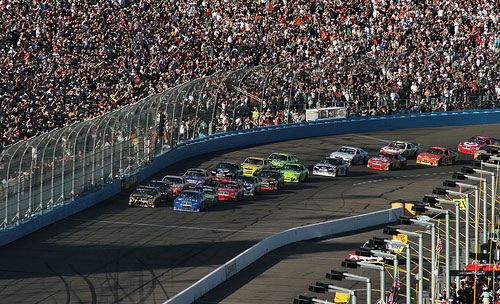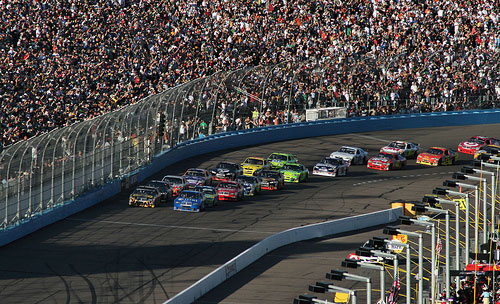 Round and round they go, when such conspicuous energy waste will stop, nobody knows. Photo: Amplified-PhotographyIn a move that USA Today says “could be regarded as economically motivated as well as environmentally aware,” NASCAR will adopt an ethanol blend of fuel beginning with the 2011 Daytona 500. This bit of news was welcomed heartily by the corn ethanol lobby, which is facing the prospect of the ethanol tax credit subsidy expiring at the end of the year as well as consumer confusion at fueling stations across the country, as ethanol blends increase only for specific model-year vehicles.
Round and round they go, when such conspicuous energy waste will stop, nobody knows. Photo: Amplified-PhotographyIn a move that USA Today says “could be regarded as economically motivated as well as environmentally aware,” NASCAR will adopt an ethanol blend of fuel beginning with the 2011 Daytona 500. This bit of news was welcomed heartily by the corn ethanol lobby, which is facing the prospect of the ethanol tax credit subsidy expiring at the end of the year as well as consumer confusion at fueling stations across the country, as ethanol blends increase only for specific model-year vehicles.
Like the ethanol industry, NASCAR is struggling, USA Today reports, and chasing “green” dollars looks like a crowd pleaser:
NASCAR has put an emphasis on recycling (all tires, oils, fluids and batteries used in competition are recycled, and sponsors have helped expand programs in campgrounds) and achieved LEED certification for new office buildings in Charlotte and Daytona Beach.
But the switch to ethanol might be the most important step in achieving an ancillary benefit — attracting new sponsors in the green economy to cash-strapped teams hurting for funding since the onset of the recession.
The only thing green in this deal is the money changing hands.
NASCAR CEO and Chairman Brian France was vague about NASCAR’s environmental motivations for embracing ethanol. The move would reduce the carbon footprint of a race, he said.
How, exactly? “We’re not exactly certain, but there is a benefit,” he told USA Today.
Here at the Environmental Working Group, we are certain that using corn ethanol as an alternative to gasoline is hardly a sustainable solution to our energy needs. We know that between 2005 and 2009, U.S. taxpayers spent $17 billion to subsidize corn ethanol blends in gasoline, an outlay that produced a paltry reduction in overall oil consumption equal to a 1.1 mile-per-gallon increase in fleetwide fuel economy.
We’re sure that corn ethanol production pollutes fresh-water sources in the Midwest. We know that there are serious concerns about ethanol plants and their impact on the environment. We know corn production for ethanol expands the dead zone in the Gulf. We also know it has led to obliteration of wildlife habitat.
NASCAR might want to ask its fans whether they’d rather watch races or be able to fish in clean water or hunt in abundant habitat.
It gets worse. According to this news release, all the ethanol supplied by NASCAR sponsor Sunoco will be produced by a plant in Fulton, N.Y., and blended with gasoline at another facility in Marcus Hooks, Pa. Which means that the fuel powering NASCAR’s racers will have to be shipped by truck to far-flung racetracks all over the country.
The result will be multiple ethanol tank trucks traveling to multiple tracks almost every week of the year. Will these huge semis be burning soy biodiesel? Doubtful.
The “green” benefit of burning thousands of gallons of diesel to haul a fuel with dubious environmental benefits to a location where hundreds of cars and trucks drive furiously around in circles, combined with the energy it takes to grow and haul the corn around in the first place is … less than zero.
If America is truly going to wean itself off its addiction to oil and fight the specter of climate change, then conservation and efficiency must be part of the solution. Promoting excessive consumption of greenhouse gas-belching fuels is a blatantly hypocritical admission that corn ethanol is about getting people to burn more corn ethanol, and not about protecting the environment.



